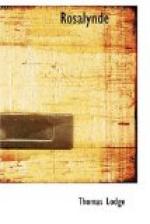[Footnote 1: spring.]
[Footnote 2: decide.]
This rigorous reply of Torismond nothing amazed Alinda, for still she prosecuted her plea in the defence of Rosalynde, wishing her father, if his censure might not be reversed, that he would appoint her partner of her exile; which if he refused to do, either she would by some secret means steal out and follow her, or else end her days with some desperate kind of death. When Torismond heard his daughter so resolute, his heart was so hardened against her, that he set down a definite and peremptory sentence, that they should both be banished, which presently was done, the tyrant rather choosing to hazard the loss of his only child than anyways to put in question the state of his kingdom; so suspicious and fearful is the conscience of an usurper. Well, although his lords persuaded him to retain his own daughter, yet his resolution might not be reversed, but both of them must away from the court without either more company or delay. In he went with great melancholy, and left these two ladies alone. Rosalynde waxed very sad, and sate down and wept. Alinda she smiled, and sitting by her friend began thus to comfort her:
ALINDA’S COMFORT TO PERPLEXED ROSALYNDE
“Why, how now, Rosalynde, dismayed with a frown of contrary fortune? Have I not oft heard thee say, that high minds were discovered in fortune’s contempt, and heroical scene in the depth of extremities? Thou wert wont to tell others that complained of distress, that the sweetest salve for misery was patience, and the only medicine for want that precious implaister of content. Being such a good physician to others, wilt thou not minister receipts to thyself? But perchance thou wilt say:
Consulenti nunquam caput doluit.
Why then, if the patients that are sick of this disease can find in themselves neither reason to persuade, nor art to cure, yet, Rosalynde, admit of the counsel of a friend, and apply the salves that may appease thy passions. If thou grievest that being the daughter of a prince, and envy thwarteth thee with such hard exigents,[1] think that royalty is a fair mark, that crowns have crosses when mirth is in cottages; that the fairer the rose is, the sooner it is bitten with caterpillars; the more orient[2] the pearl is, the more apt to take a blemish; and the greatest birth, as it hath most honor, so it hath much envy. If then fortune aimeth at the fairest, be patient Rosalynde, for first by thine exile thou goest to thy




